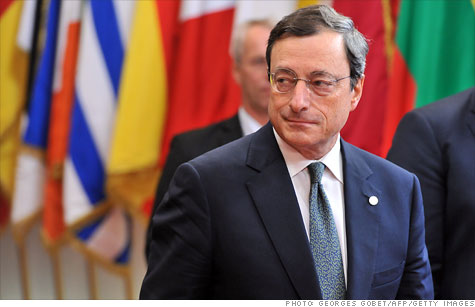Search News

In the short run, Mario Draghi's European Central Bank remains the only institution with the means to stop future market panics.
Douglas J. Elliott, who worked as an investment banker for two decades, is a fellow at the Brookings Institution.
Judging Europe's fifth attempt at a comprehensive solution to the euro crisis requires reading the minds of Mario Draghi and the other leaders of the European Central Bank.
In the short run, the ECB remains the only institution with the financial capacity to stop a future round of market panic that could lock Italy or Spain out of the bond markets.
The question: Did the summit do enough to solve the eurozone's medium- and long-term problems and thus persuade the ECB it could massively intervene in the bond markets if the need arises in coming weeks?
ECB President Draghi spoke quite positively about the summit outcome, but it is very unclear what this pronouncement would actually mean for future ECB actions.
After all, on Thursday Draghi went out of his way to pour cold water on the idea that it would be the ECB's role to intervene in bond markets in a big way -- as opposed to working around the edges.
The ECB remains wary of taking bold action that might take pressure off the government leaders to truly solve the underlying problems, leaving the ECB with all the risk. ECB leaders feel they already lived through this in a smaller way this summer, when they stepped up purchases of Italian bonds only to see Italian President Berlusconi try to backslide on his reform promises as market pressure eased.
Europe needs solutions in three different time-frames.
Short-term: Markets need to know that someone has the money and the will to fund Italy or Spain if private markets become too scared to do so. This is a real possibility at some point, given the serious economic difficulties that both face and the very tricky politics their governments need to navigate.
This week's summit did not produce an agreement that would provide sufficient funds to reassure the markets on this score, effectively leaving this to the ECB.
Yes, leaders agreed to infuse roughly €200 billion into the International Monetary Fund. And that would increase the capacity of the IMF to intervene if required, but it's not nearly enough to provide the full support markets would need to see, given the scope of the problem.
Medium-term: Eurozone institutions need to be strengthened so that governments, not the central bank, can provide the funds a troubled member state might need. In return, there needs to be an assurance that all member states will run their budgets responsibly.
The summit made real progress in both of these regards.
First, leaders agreed to bring forward the new European Stability Mechanism, or ESM, to the middle of next year. The ESM is a €500 billion fund that should work much better than the current mechanism to provide funding for troubled countries. It will run alongside the present mechanism for a year, thus providing additional funds, not just replacing the old approach.
The total of the two funds will purportedly be capped at €500 billion, reducing the new funding, but that cap could easily be changed by the time we get there.
It is also positive that the leaders have now backed off from the idea of "private sector involvement" or forcing losses on government bond holders when countries hit trouble. The threat of those forced losses was a main reason for the spread of panic across sovereign debt markets in recent months.
Second, they agreed to put together a treaty change that will give European institutions much more control over individual national budgets, if those budgets risk being irresponsible.
There will be serious implementation issues with the summit proposals on budgetary discipline, although I believe these will be worked out in the end.
Long-term: Finally, the summit did little to address the long-term issues of competitiveness.
How does a country like Greece or Portugal regain the ability to compete in the world economy without the capacity to take the seemingly easy approach of devaluing its currency? Their cost structures are too high for them to export effectively.
Unfortunately, the existing ways to reduce relative costs are extremely painful, and therefore politically very difficult. Answers need to be found, but they certainly did not come out of this summit, which was understandably focused on the immediate problems. ![]()
| Overnight Avg Rate | Latest | Change | Last Week |
|---|---|---|---|
| 30 yr fixed | 3.80% | 3.88% | |
| 15 yr fixed | 3.20% | 3.23% | |
| 5/1 ARM | 3.84% | 3.88% | |
| 30 yr refi | 3.82% | 3.93% | |
| 15 yr refi | 3.20% | 3.23% |
Today's featured rates: